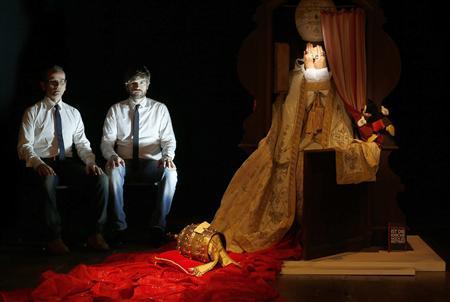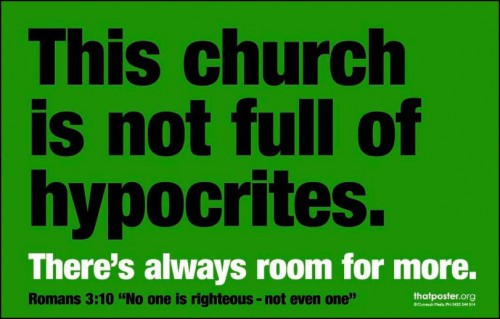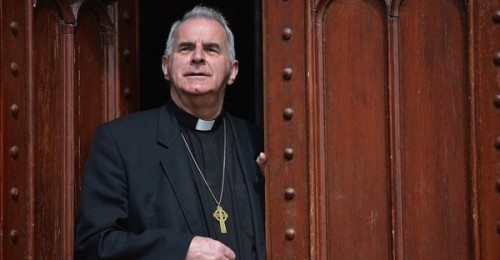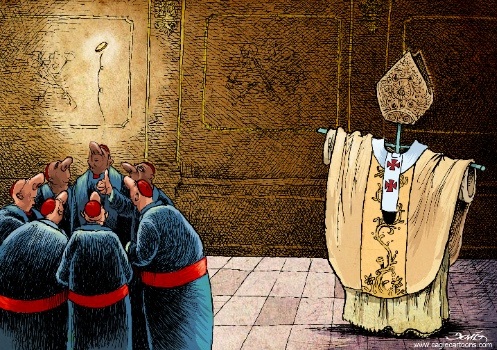By Mary Hunt
The obvious question is why any self-respecting feminist would worry about the Pope, the Roman Catholic Church, and its machinations. My simple answer is POWER. Religion is one of the many sources that shape how power is shared (or not) in this world. Feminists need to pay attention to the sharing of power if we think we are going to reshape the world in a more just and egalitarian way. As someone who speaks “Catholic,” indeed as a theologian rooted in the tradition, I think there is a lot of power in the balance at the moment, and I want to see it shared.
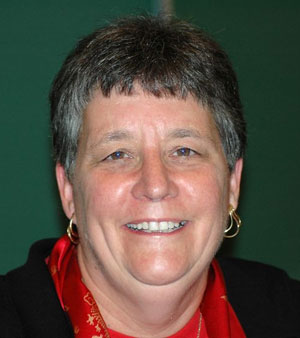 The papal transition underway in Rome is a classic example of patriarchy prancing for the world to see live and in color. It is without a doubt the biggest religious news story thus far in the 21st century, and there is not a woman in sight. Think about that in light of the media coverage. Apart from the many women reporters now in Rome, the players in this story are all men, all the time.
The papal transition underway in Rome is a classic example of patriarchy prancing for the world to see live and in color. It is without a doubt the biggest religious news story thus far in the 21st century, and there is not a woman in sight. Think about that in light of the media coverage. Apart from the many women reporters now in Rome, the players in this story are all men, all the time.
Of course women are seen in the vast crowds that flock to St. Peter’s Square or greeting the helicopter bearing the out-going pope at his new digs at Castel Gandolfo. But there are virtually no women in the big news of the papal transfer save the nuns who were relocated from their convent so that the Pope Emeritus will have a new place to live in his old neighborhood. They are symbolic of the problem I am underscoring, as I doubt they were consulted. Even the Virgin Mary was consulted!
Likewise, the story of the implosion of the patriarchal church (what Elisabeth Schüssler Fiorenza has better called “kyriarchy”[1]) is utterly devoid of women. Whether the Vatican banking scandal, sexual abuse, or episcopal cover-up, this has been a men’s show from the beginning, and they have done a royal job of making a mess.
I do not think women would necessarily have avoided these pitfalls. However, the historical fact is that as far as we know, women were not involved. Therein lies the most obvious place to start looking at this situation from a feminist perspective. Who else isn’t there and why? Young people, married people, out LGBTIQ people, more than a few men of color, the list is endless. Yet no one seems to notice, or if they do notice they do not seem to care. I notice and I care!
The Conclave will start soon. 115 mostly older men will select the successor to the man who named them as cardinal electors (virtually all of the cardinals were named by Benedict XVI or John Paul II for whom Benedict was the shadow pope for several years). Chances are good that the new pope will be even more conservative than the two before him. Perhaps he will be a little more charismatic, or a little better manager, maybe even from a developing country, but the fundamental conservative trajectory is set, not to be undone.
I would guess that he has already been selected. What organization the size of the Roman Catholic Church would be without a succession plan with an 86 year old CEO? I suspect he is already at work despite the many myths and stories of the secrecy and spirituality of the conclave, and now the display of robes in small, medium and large on hand to fit the fellow who is saddled with the impossible job of being pope. The current discussion, as far as I can tell, is really about what team will hold sway. All heads of Vatican offices must resign at the end of a papacy. So there are many personnel matters, i.e. who will have what power, being decided at the official meetings that began in Rome on March 4, 2013.
There are also lots of informal meetings going on constantly as the gentlemen reshuffle the deck. This is a power shift akin to when a Republican defeats a Democrat. There are a lot of careers and plenty of ideology at stake for which the actual pope is but a vivid symbol. The best analogy is electing a U.S. president because of whom s/he will elect to the Supreme Court. Think of how carefully they have to vet all of the players now that Scotland’s Cardinal O’Brien has been brought down by his former lovers. Skeletons in closets do tend to rattle when the stakes are high, and the stakes are high in terms of the power to shape the future direction of this big church.
No matter who is elected, the process is mortally flawed because it represents a model of church that is long out of date. Until and unless structural changes take place to develop a well integrated, representative governing model in which all members of the Catholic community—including women, married/partnered people, young people—are involved there will be no change. Beginning with local base communities and parishes, adult members need to have real decision-making power about personnel, money, property, sacramental, and social justice work. The same goes for dioceses and regions such that increasingly representative bodies make decisions that clerics cannot overrule. This includes people from the poorest most marginalized parts of the world whose well being and dignity ought to be the center of Catholic concern but clearly is not. We who are part of the community expect and demand that we exercise voice, vote, and responsibility in ministry and in governance.
I am not interested in the personal characteristics of a new pope, even in betting on the outcome of the papal horse race. That is the patriarchal frame of the discussion, which I think feminists need to reject. If I respond favoring Cardinal X over Cardinal Y, or if I sketch out the characteristics of a “kinder gentler” pope, then I am conceding that the model is acceptable. It is not.
I am interested in getting rid of the papacy and other trappings of monarchy in favor of a democratic, participatory model of church. Please don’t suggest that I become a Presbyterian. Though some of my best friends are Presbyterians, I am what a Catholic can and should look like in the 21st century. This is the change we need.
Even though my goal of dismantling the kyriarchy is unlikely to hold sway, I want to look at the religious significance of the elite, exclusionary approaches to governance that are playing out on worldwide television and web because they have a shaping influence. I try to forget what I know about all of the inner dealings of the Roman Catholic Church (electing a pope is like watching the law and sausage being made—not a pretty sight) and imagine what those who simply see the spectacle played out on screen think. I suspect that what people see is at once convincing and confusing.
The trope of tradition is very persuasive. Even though the most recent pope resigned and then made up new rules for the conclave that will replace him, most people do not see the clear elasticity of the church. Those in power reserve to themselves such conscience-bound decisions as resigning from the papacy, while women who make choices about their own bodies are labeled sinners. The gentlemen change the conclave rules with the wave of a Motu Proprio (“on his own impulse”) as they call it, but when we lay people decide on our own impulses to use birth control or to love in a same-sex way we are considered sinful.
The smoke and mirrors that the media report on draw people’s attention to mistaken notions of timeless, tradition-bound splendor. It is hard to compete with the costumes—everyone knows about the pope’s red shoes that signify the blood of the martyrs—the music, the buildings, the grounds for what appears to be God’s own realm. People love the quaint notion that the Cardinal electors will be locked away without their smart phones to let the Holy Spirit decide on the pope’s successor. I do not want to offend anyone, but I am realistic enough to think the deal is long done and the pageantry, not unlike the Wizard of Oz, is simply good for business.
What astounds me is why intelligent people, especially those in the media, are not scratching their heads in utter confusion about the whole scene. Shareholders, stakeholders have absolutely no input into the process. Imagine if this kind of election took place in Cuba or in Washington! I would think they would have some critical questions to ask—where are the women, where are the young people, where are more people of color who make up the growing majority in the church? Of a billion people this tiny cadre has all the power? What is wrong with this picture?
A great deal is wrong with it. The worst part, in my view, is the instrumentalization of religion, of people’s faith, to reinscribe and reinforce ways of being and acting as if they were the will of the divine. This is blasphemy. I make no such counter claim that my approach is what God wants. Rather, I assume that human beings can and should organize themselves in ways that reflect their most deeply held values. To see 115 men hold the power in a worldwide community is frightening because of what it means about their sense of the divine. Obviously they think God favors men over women, the few over the many, their privileged information over the sensus fidelium. Where they read this in Christian scripture is not clear. I respectfully disagree and urge us to change the power model as quickly as possible, beginning by withdrawing financial support from the institutional Roman Catholic Church.
There are deep social implications of the world’s largest Christian denomination modeling a monarchical way of being in an increasingly democratic world. Apart from looking ridiculous and offending people at every turn such that the second largest denomination in the US is ex-Catholics, the outcome of this exercise is to reinforce the power of patriarchy. If these men can act with impunity then other corporations can have few if any women in their boardrooms. If this monarchical model is acceptable, than governments do not need to allow their citizens voice and vote. If God wills the outcome of a papal election, then surely God wills wars, ecocide, and other human-made problems. I reject this theology.
It may be imputing too much power to the Roman Catholic Church to say that it shapes people’s worldviews. But there is virtually no other religious body—not Islam, not Judaism, not the World Council of Churches—that will be the focus of such attention, that will be able to foist its narrative on the world for free in the next few weeks. Given the fact that it is misogynist, exclusivist, kyriarchal in every sense of “lordship” over the majority, I think feminists need to reject it while still affirming the underlying fundamental values of love and justice.
Several feminist strategies are important for countering this approach and creating constructive new ways of being church that focus on participation, safety, and accountability. Keep it simple—stop, look, listen—as we say to children when we teach them to cross the street.
STOP the process.
There is no reason that the papacy cannot remain vacant for a time. Church history includes examples of deadlocked conclaves, lengthy meetings that lasted months unto years. Pope Benedict’s own resignation and subsequent change of conclave rules are evidence of the elasticity of customs and laws.
The current situation of the church is grave: sexual abuse and cover-ups, financial problems, loss of trust and transparency, tawdry sexual conduct, and most importantly, the wholesale exclusion of most members of the community, especially women, from decision-making. Given this gravity, the best solution is simply to call off the conclave. The energies and resources saved can be channeled into envisioning and constructing new, more inclusive ways of being church where safety and accountability are paramount.
LOOK at the facts.
Contemplative Catholic spirituality invites “a long loving look at the real.” Despite the pomp and pageantry of the papal transition, institutional Catholicism is in tatters. No amount of white smoke can obscure the corruption and infighting. No Gregorian chant can drown out the cries of those who have been abused. No reading of the Gospel can excuse the oppressive treatment of women and same-sex loving people.
By contrast, small base communities, some parishes, and many religious communities are robust places where sacraments and solidarity are the norm. Groups across the globe work on social justice, education, and health care based on Catholic commitments without institutional connections. The disconnect is profound between hierarchy and laity. Nonetheless, educated, willing, and capable Catholics abound who embrace the responsibility to be church despite the scandalous actions of the leaders.
LISTEN to the Spirit.
Catholics believe that the Holy Spirit infuses the world with grace. Rather than watch a new pope emerge from the delegates who have been handpicked by the previous two popes, it is time for new ways of organizing and governing the more than one billion members of the Catholic community. Contemporary culture of inclusion and participation demands it, and technology makes it possible.
One new model of church would include a team of people from around the world who represent various and sundry national/regional groups, different styles of worship and ministry, various lifestyles and families, religious and secular people. It would be a democratic assembly of equals, a global network of the people of God, who delegate the fruits of their decisions to ministers who carry out the will of the body in teaching and preaching, sacraments and social justice, finances and public witness.
For those who are not Catholic, this is a time to stop worrying about charges of anti-Catholicism and join voices with those of Catholic feminists who cry foul on the process and the product of the upcoming conclave. Those who have no stake in Catholicism can be helpful by asking the obvious questions of who is not included, involved, able to minister, make decisions, and otherwise exercise adult faith. There is no need to settle for the answer, “They do this because they are Catholic,” and be told if it is not your tradition to have no voice.
The stakes, when examined in global terms, are simply too high. If religions shape worldviews, then everyone has the right and responsibility to look critically at it and go about the communal task of creating something better.
Complete Article HERE!

